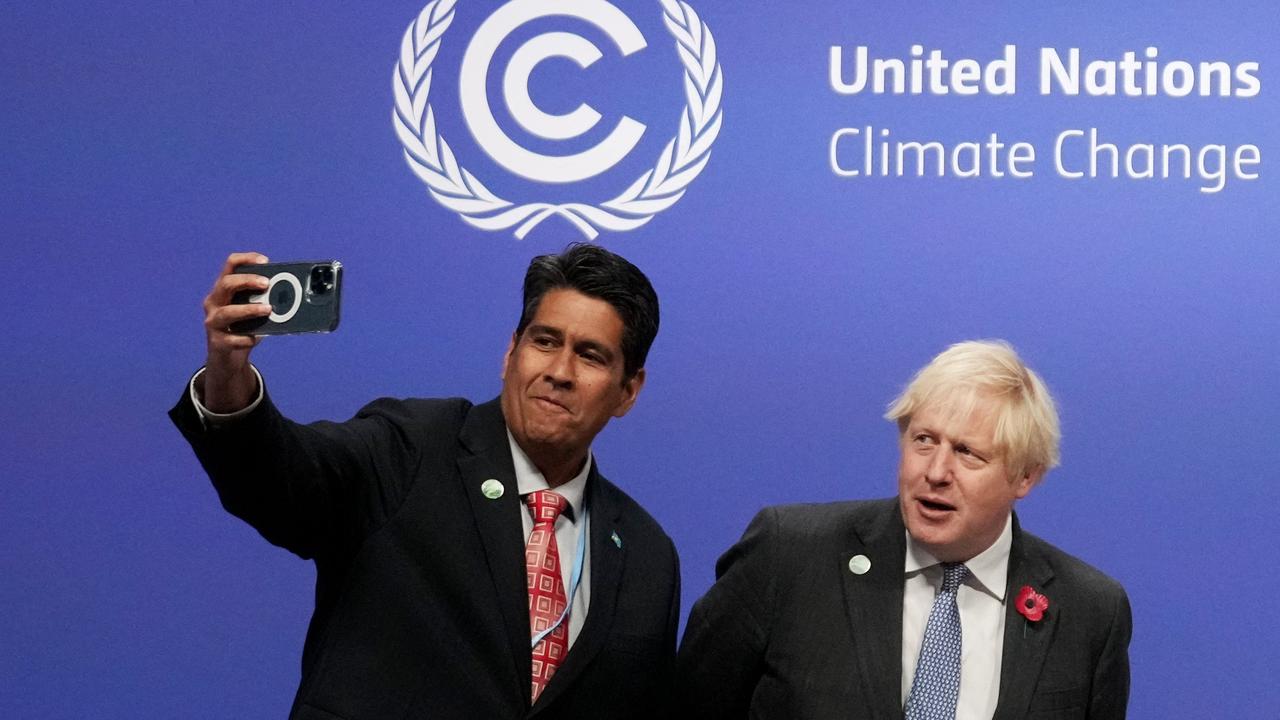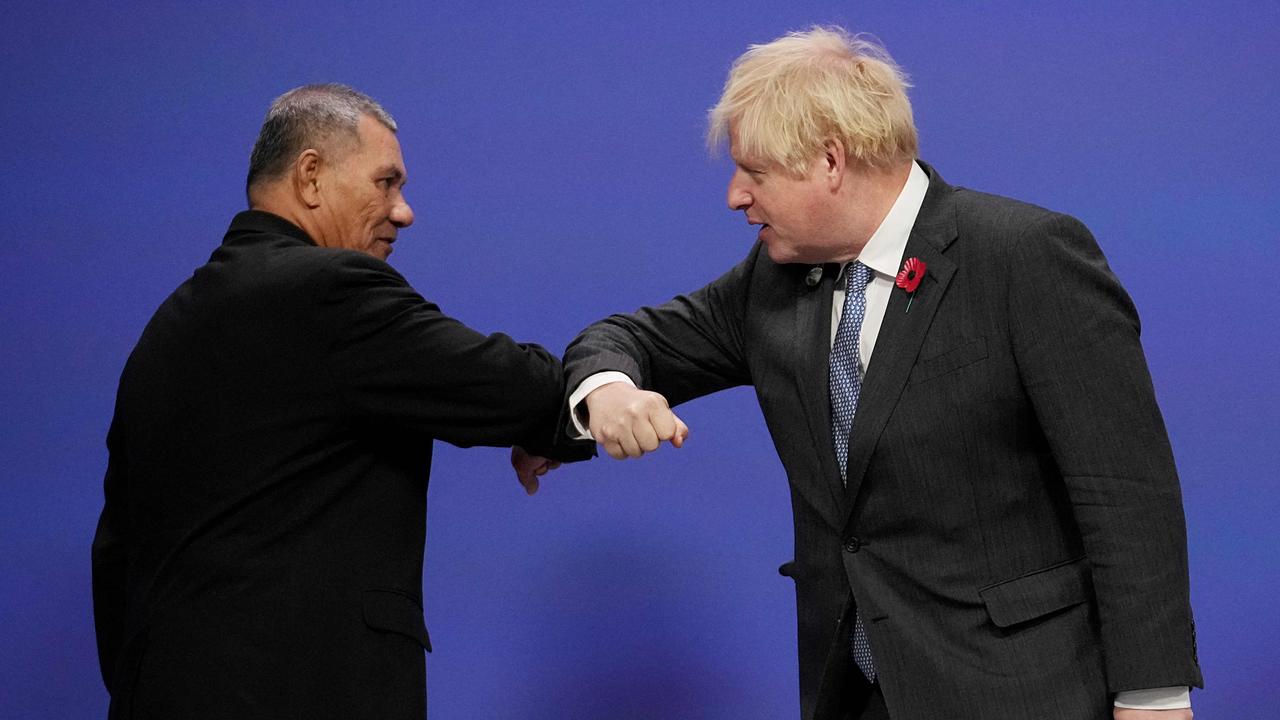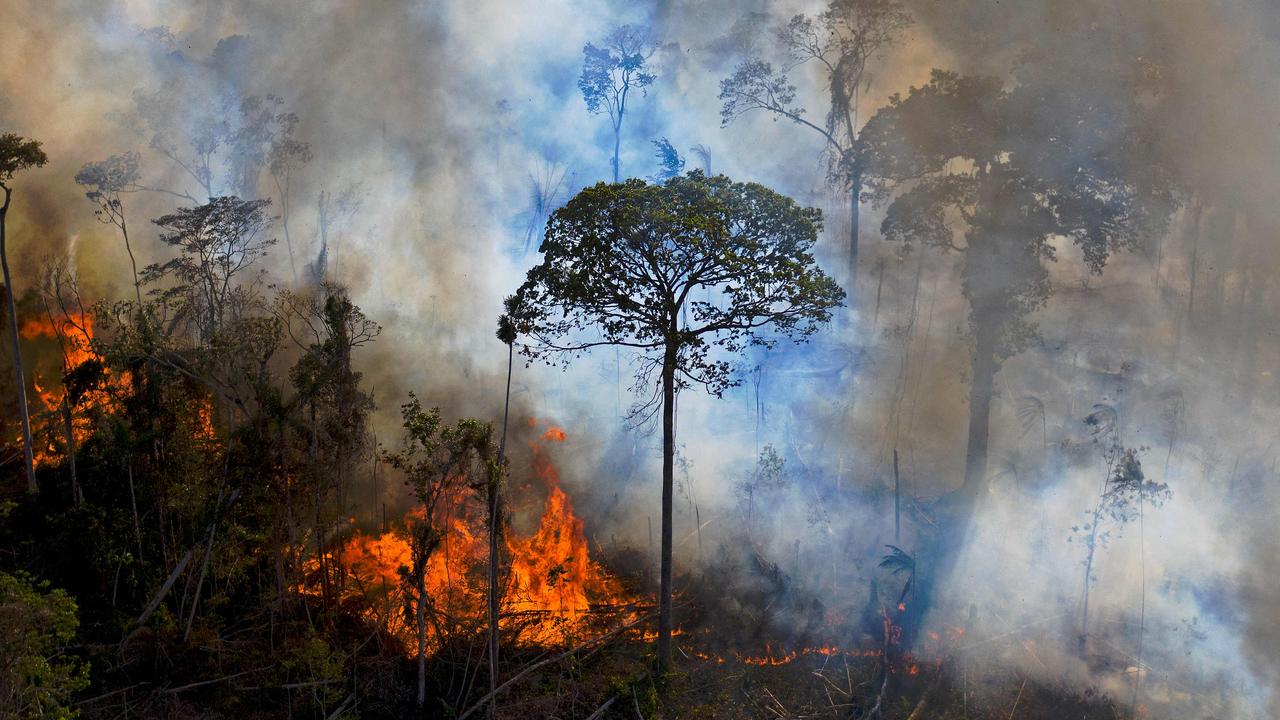Climate change activist warns Pacific Islands will be under water in a decade as COP26 leaders vow to save forests
A dire warning has been issued surrounding Australia’s Pacific Island neighbours, with claims they will be under water sooner rather than later.
A Samoan climate activist has issued a stark warning that Pacific Islands including Tuvalu will be underwater in a decade.
Brianna Fruean told UK radio’s Iain Dale after speaking at the COP26 summit in Glasgow that low-lying Pacific Islands face devastation and even “extinction” within a decade due to ongoing issues surrounding climate change.
She said findings based on the IPCC report meant there was “about a decade” until islands, notably Tuvalu followed by Samoa, are under water.
@Brianna_Fruean from the Pacific Climate Warriors @350Pacific spoke at the #COP26 Leaders Summit today 🌊 sharing an important message to world leaders. "We are not drowning, we are fighting!" ✊ Listen to her powerful words below 👇 #PeopleToTheFront#DefundClimateChaospic.twitter.com/6YHntMdvIz
— 350 dot org (@350) November 1, 2021
She had earlier echoed these concerns to global leaders including Joe Biden in Glasgow, with a “message to Earth” that “we are not drowning, we are fighting. This is our warrior cry to the world”.
Australia's pledge is a start. I've now urged @ScottMorrisonMP to show us a concrete plan to halve emissions by 2030.
— Frank Bainimarama (@FijiPM) November 1, 2021
I've given him a copy of Fiji's Climate Change Act as a guide –– it is our uniquely Fijian way of following the science to keep faith with future generations. pic.twitter.com/8c3UZIfFNg
“I’m from a region that contributes the least but feels the impact the most,” Ms Fruean said.
“Whilst we’ll be the first to experience it, we certainly won’t be the last.”
It came after Fijian Prime Minister Frank Bainimarama fronted world leaders at the climate summit with a similar warning to “pick up your buckets ad start bailing, now, before it’s too late.”
Only four Pacific Islands are represented at the summitt due to Covid-19 restrictions, with fears those most at risk from the effects of climate change will be forgotten.
Palau’s president, Surangel Whipps Jr, joined the chorus and called for “immediate” action.
“We want the people at this conference to understand that we can no longer just talk about it and make baby steps or kick the can down the road,” he said.
“We need to take immediate action. Studies show that a hundred billion is needed annually just to cope.”
“Climate finacing must be equitably distributed and large emitters must step up and deliver.”
Fiji’s Prime Minister, Voreqe Bainimarama at #COP26:
— Eden Gillespie (@edengillespie) November 1, 2021
"We Pacific nations have not travelled to the other end of the world to watch our future to be sacrificed at the altar of appeasement of the world's worst emitters."
Australian Prime Minister Scott Morrison announced Australia will double its initial climate finance commitment for “our pacific family and south East Asian partners” to $2 billion at COP26.
“Today it was very pleasing to be able to join with our Pacific Island family of those who were able to join us here today,” Mr Morrison said.
“We wish more of them were able to come, but COVID has prevented many of them from coming to Glasgow. But their voices will be strong and we’ve been listening carefully to their voices over many years.”

First major climate deal
World leaders meeting at the COP26 climate summit in Glasgow will issue a multibillion-dollar pledge on climate change but the focus is expected to surround ending deforestation by 2030.
According to summit hosts the British government, the pledge is backed by almost $20 billion in public and private funding and is endorsed by more than 100 leaders representing over 85 per cent of the world’s forests, including the Amazon rainforest, Canada’s northern boreal forest and the Congo Basin rainforest.
British Prime Minister Boris Johnson said the agreement on deforestation was pivotal to the overarching ambition of limiting temperature rises to 1.5 degrees Celsius.
“These great teeming ecosystems — these cathedrals of nature — are the lungs of our planet,” he was expected to say in Glasgow, according to Downing Street.
“Forests support communities, livelihoods and food supply, and absorb the carbon we pump into the atmosphere. They are essential to our very survival,” said Johnson, who is chairing the summit.
“With today’s (Tuesday’s) unprecedented pledges, we will have a chance to end humanity’s long history as nature’s conqueror, and instead become its custodian.”


The signatories include Brazil and Russia, which have been singled out for accelerating deforestation in their territories, as well as the United States, China, Australia and France.
The government of Brazil, much criticised for its environmental policies, announced Monday at the summit that it would cut 2005-level greenhouse gas emissions in half by 2030 — up from a previous pledge of 43 per cent.
“We are presenting a new, more ambitious climate goal,” Environment Minister Joaquim Leite announced in a message transmitted from Brasilia to Glasgow.
Almost a quarter of all man-made emissions of carbon dioxide can be attributed to land use activity such as logging, deforestation and farming.
President Joko Widodo of resource-rich Indonesia said his own archipelago’s rainforests, mangroves, seas and peatlands were key to restricting climate change.
“We are committed to protecting these critical carbon sinks and our natural capital for future generations,” he said in a UK government statement.
The summit pledge to “halt and reverse deforestation and land degradation by 2030” encompasses promises to secure the rights of indigenous peoples, and recognise “their role as forest guardians”.
While Johnson described the pledge as “unprecedented”, a UN climate gathering in New York in 2014 issued a similar declaration to halve the rate of deforestation by 2020, and end it by 2030.
I had a great meeting with President Joko Widodo of Indonesia this afternoon. We’re committed to strengthening the partnership between our two nations — and I look forward to the work ahead under Indonesia’s forthcoming G20 Presidency. pic.twitter.com/nz9T0hIvfK
— President Biden (@POTUS) November 1, 2021
However, trees continue to be cut down on an industrial scale, not least in the Amazon under the far-right government of Brazilian President Jair Bolsonaro.
Humans have already cut down half of Earth’s forests, a practice doubly harmful for the climate when CO2-sucking trees are replaced with livestock or monoculture crops.
Greenpeace criticised the Glasgow initiative for effectively giving the green light to “another decade of deforestation”.
“Indigenous peoples are calling for 80 per cent of the Amazon to be protected by 2025, and they’re right, that’s what’s needed,” said Greenpeace Brazil executive director Carolina Pasquali.
“The climate and the natural world can’t afford this deal,” she said. Many studies have shown that the best way of protecting forests worldwide is to keep them under the management of locals with generations of preservation knowledge.
The commitment comes a day after UN Secretary-General Antonio Guterres harangued the gathered leaders to act to save humanity.
“It’s time to say: enough,” he said.
“Enough of brutalising biodiversity. Enough of killing ourselves with carbon. Enough of burning and drilling and mining our way deeper. We are digging our own graves.” Summit host Johnson warned of the “uncontainable” anger of the younger generations if the leaders failed to act decisively on climate change.
The UN COP26 conference will continue for another two weeks to try to craft national plans to forestall the most devastating impacts of global warming.



